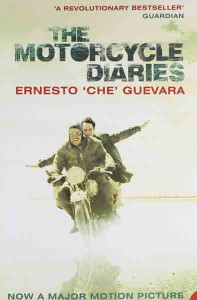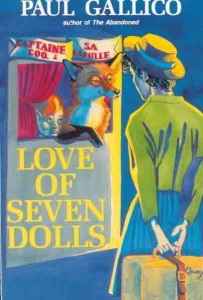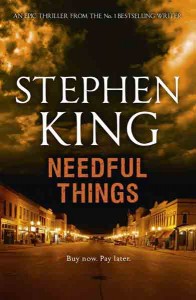Love at first line What a wondrous web we are entangled in when we read the first lines.
I must have been about 12 or 13 when I started reading Paul Gallico. It was Love of Seven Dolls, a birthday gift from a friend to an aunt. Strange title, I thought, what on earth does it mean? A slim book, barely a hundred pages, which began: “In Paris, in the spring of our times, a young girl was about to throw herself into the Seine.” Then, a couple of paragraphs further down the page: “Do you remember Paris that May when spring came early and the giant candelabra of the chestnut trees in bloom illuminated the beautiful city?”
I knew neither the Seine nor chestnut trees, and nothing about Paris save its name but I was hooked into what I still consider pure magic. By the time I finished the book — in one sitting, and several times since — I realised, yes, of course, it had to be Love of Seven Dolls, what else could it have been? I have recommended this book to friends and others everywhere — their first reaction has always been “What? What’s that again? Love of…what?”
I hunted unsuccessfully in bookstores for a copy for myself — this was well before the age of cyber activity; the book remained out of print for years, or at least unavailable in India. Until one fine birthday in Delhi, in 1991, a book landed in my hands with the inscription: “The search has ended…”
Famous or evocative first lines do not just belong to fiction. Take a book like Why I Am Not A Hindu by Kancha Ilaiah.
Some of us have Charles Dickens embedded in our brains. Remember A Tale of Two Cities? “It was the best of times. It was the worst of times, it was the age of wisdom, it was the age of foolishness, it was the epoch of belief, it was the epoch of incredulity, it was the season of Light, it was the season of Darkness, it was the spring of hope, it was the winter of despair, we had everything before us, we had nothing before us…”
The words resonate even as I type in these lines, just as Harper Lee’s words from To Kill a Mockingbird resonate in a dramatically, diametrically different way: “When he was nearly thirteen, my brother Jem got his arm badly broken at the elbow.” Such a simple statement, but it plunges us right in the middle of the action and we want to know more. I know I did. And what a world that book opened up, a world alien and unfamiliar, a world that by the time the book was read and done remained engraved eternally upon a teenager’s consciousness.
Thinking about opening lines, I pulled out books at random from my overflowing bookshelf. Incidentally, there was a time when I would mourn and scold whenever a book that I had loaned someone went walkabout. These days — maybe it’s age, maybe it’s wisdom — I don’t mind so much although there’s still a dull ache inside because frankly, there’s no room at this inn. So long as whoever is in possession of my precious copy has read it and enjoyed it and treasures it, and maybe even passes it on to others to read. That’s the hope.
Anyway, so there was Che Guevara’s The Motorcycle Diaries on top of the pile, in translation from the Spanish (by Alexandra Keeble), of course. The first chapter is titled ‘So we understand each other’. I remember I fell in love with that statement right away. The story, or the diary, begins: “This is not a story of incredible heroism, or merely the narrative of a cynic; at least I do not mean it to be. It is a glimpse of two lives that ran parallel for a time, with similar hopes and convergent dreams. In nine months of a man’s life he can think a lot of things, from the loftiest meditations on philosophy to the most desperate longing for a bowl of soup — in total accord with the state of his stomach.”
Earlier I would mourn whenever a book I had loaned went walkabout. These days — maybe age or wisdom — I don’t mind so much, hoping it has been passed on for others to read.
I couldn’t stop; nor have I stopped presenting copies of the book to young friends whenever I see it in bookstores. Occasionally the book is accompanied with a Che t-shirt and I have to confess that brings a brighter light to recipients’ eyes!
About two years ago, a friend passed on a copy of The Garden of Evening Mists by Tan Twan Eng. “Tell me what you think,” he said. It’s a small book with small print and I began reading right away: “On a mountain above the clouds once lived a man who had been the gardener of the Emperor of Japan. Not many people would have known of him before the war, but I did.” Yes! The quiet elegance of the prose yielded a fulsome flavour that steadily grew into a dread-knot that slowly unravelled itself.
Famous or evocative first lines do not just belong to fiction. Take a book like Why I Am Not A Hindu by Kancha Ilaiah: “I was not born a Hindu for the simple reason that my parents did not know that they were Hindus. This does not mean that I was born as a Muslim, a Christian, a Buddhist, a Sikh or a Parsee. My illiterate parents, who lived in a remote South Indian village, did not know that they belonged to any religion at all.”
Hard-hitting. Mind-blowing. The book’s powerful ideas remain in your head to temper and season you forever. Some people are driven crazy, others are infuriated, while still others are rendered incredulous. Some, however, are changed.
That’s the thing about books. You start reading and by the time you finish, something in your wiring changes.
What about the writer? Stephen King, in an interview with Joe Fassler published in The Atlantic (July 23, 2013), said: “When I’m starting a book, I compose in bed before I go to sleep. I will lie there in the dark and think. I’ll try to write a paragraph. An opening paragraph. And over a period of weeks and months and even years, I’ll word and reword it until I’m happy with what I’ve got. If I can get that first paragraph right, I’ll know that I can do the book.”
 He goes on to talk about what he considers the best opening line from among the books he’s written. He chooses Needful Things: “…the story starts off with an opening line, printed by itself on a page in 20-point type: ‘You’ve been here before.’ All there by itself on one page, inviting the reader to keep reading. It suggests a familiar story; at the same time, the unusual presentation brings us outside the realm of the ordinary. And this, in a way, is a promise of the book that’s going to come.”
He goes on to talk about what he considers the best opening line from among the books he’s written. He chooses Needful Things: “…the story starts off with an opening line, printed by itself on a page in 20-point type: ‘You’ve been here before.’ All there by itself on one page, inviting the reader to keep reading. It suggests a familiar story; at the same time, the unusual presentation brings us outside the realm of the ordinary. And this, in a way, is a promise of the book that’s going to come.”
Promise, that’s the word. It’s the promise of what’s to come. As in Moni Mohsin’s The Diary of a Social Butterfly: “Haw, such a big scandal in our group, na! Tonky’s wife, Floozie, has run off with his best friend, Boxer, who is married to Floozie’s best friend, Dropsy. Just look! What a tamasha. Everybody is talking about it at weddings, darses, parties, everywhere. Floozie’s name is mud. Worse than mud. Mud mixed with cow shit, like the pheasants in Janoo’s village use to make their houses. (Or do they use straw? Khair, whatever.)” Totally irreverent, absolutely outrageous, and entirely unputdownable. I binge-read this one, driving colleagues crazy by nabbing them round every corner and reading aloud bits. That’s the kind of book it is. Love at first line. And we all know love defies definition.
That’s why, when I ordered a copy of Olympics: The India Story by Boria Majumdar and Nalin Mehta for purely research purposes, I fell, lock, stock and barrel, in love. Check it out: “India was the first colonised Asian nation to take part in the Olympic Games.” Didn’t I say love at first line has no basis in scientific logic or philosophical reasoning? The proof is entirely in the savouring of the book.
The columnist is a children’s writer and senior journalist.


